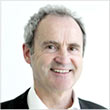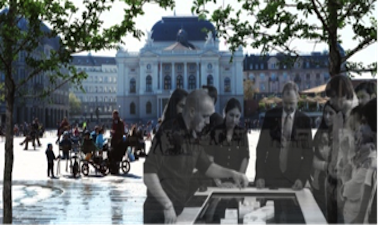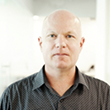About this course
Responsive cities define the future of urbanization. They evolve from smart cities, with a fundamental difference: The citizens move from the center of attention to the center of action. Responsive citizens use smart technology to contribute to planning, design and management of their cities.
Responsive cities are about bringing cities back to their citizens. Responsive cities change the way the technology of a smart city is used. The first Smart Cities were technology driven and they produced large amounts of data from fixed or centrally controlled sensors. But by now, the citizens and their mobile phones have taken the leading role in direct data generation. Rather than using data that are centrally collected and stored, you will see platforms on which the citizens place the data and the information they decide to share. With this, your own responsibility becomes a foundation of a Responsive City. Cities evolve from being smart to being responsive.
To demonstrate the potential of Responsive Cities, this course will define the concept of Citizen Design Science, a combination of Citizen Design, Citizen Science and Design Science. Experts, citizens and scientists participate in Citizen Design Science. This approach is still in an early stage of development, but with the Responsive Cities Massive Open Online Course, you will be ahead in exploring and defining its possibilities.
‘Responsive cities’ is the fourth edition of the ‘Future Cities’ series on urban MOOCs. The ‘Future Cities’ series is the first and complete series of urban courses dealing with the design, management and transformation of cities for their sustainable and resilient future. With every edition, the series becomes more interactive. It increasingly empowers citizens around the world to become part of the development of their own cities, especially in those places where this knowledge is needed most. Therefore, the course is inclusive for every individual interested in the planning, construction, redevelopment and management of future cities. The course is open to anyone regardless of background, skills, knowledge, or age.
This is paragraph 2 of the long course description. Add more paragraphs as needed. Make sure to enclose them in paragraph tags.
Course Staff
Gerhard Schmitt
Professor of Information Architecture, ETH Zurich
Gerhard Schmitt is Professor of Information Architecture at ETH Zurich, leader of the ETH Future Cities Laboratory Simulation Platform and Principal Investigator in BigData-Informed Urban Design of the Future Cities Laboratory 2, Founding Director of the Singapore-ETH Centre in Singapore, and ETH Zurich Senior Vice President for ETH Global. His research focuses on urban simulation, Smart Cities and linking Big Data with Urban Design. From 1998-2008 he served as Vice President for Planning and Logistics and Member of the Board of ETH Zurich. He directed the development of ETH’s strategy and planning in cooperation with the 16 scientific departments. From 1984 to 1988 he conducted CAAD research and teaching at Carnegie Mellon University. He was Visiting Professor at Harvard GSD, at the Katholieke Universiteit Leuven, the Technical University of Denmark and at the Technical University of Delft. From 2004-2007 he chaired the Visiting Committee of the Graduate School of Design at Harvard University and initiated ETH Science City.
Stephen Cairns
ETH ZurichScientific Directory of the ETH Future Cities Laboratory,
Stephen Cairns completed his undergraduate degree in anthropology and classical studies at the University of Otago. He trained in architecture at the University of Auckland, and practiced as an architect in New Zealand, Australia and the Pacific, designing the competition-winning entry for the Headquarters for the Secretariat of the Pacific Community in Noumea. He subsequently undertook doctoral studies at the University of Melbourne writing a thesis on the colonial architecture in Java, with an emphasis on aesthetics and the politics of representation.
On completion of his PhD he was appointed to a Lectureship at the University of Melbourne. He took up a Senior Lectureship at the University of Edinburgh, and was appointed Professor of Architecture and Urbanism there in 2009. He served as Head of Department of Architecture, and Director of the newly founded Edinburgh School of Architecture and Landscape Architecture. He is currently based in Singapore where he is Scientific Director of the Future Cities Laboratory.
Estefania Tapias
Postdoctoral fellow and Lecturer, Chair of Information Architecture, ETH Zurich
Estefania Tapias is Postdoctoral fellow and Lecturer at the Chair of Information Architecture, ETH Zurich. Her research is focus on Information Cities and climate-sensitive urban planning. Estefania attained her doctoral degree at ETH Zurich and obtained the PhD label from Climate-KIC; one of three Knowledge and Innovation Communities (KICs) created by the European Institute of Innovation and Technology (EIT). At ETH Zurich she teaches the course ‘Digital Urban Simulation’ where ETH students learn how to analyse and generate spatial urban configurations with advanced computational methods.
Bige Tunçer
Associate Professor, Singapore University of Technology and Design
Bige Tunçer is an associate professor at Singapore University of Technology and Design. She leads the Informed Design Group, which focuses on data collection, information and knowledge modeling and visualization, for informed architectural and urban design. She has led and participated in various research projects in design computation. She currently leads a large multi-disciplinary project, investigating multi-modal data collection on user and usage information of public spaces in residential new towns, and develops a design system for the adaptive redesign of such spaces. She has taught many design computation and studio courses to undergraduate and graduate students. Currently she teaches Capstone, where all engineering and architecture students form groups to work on industry defined and funded design projects and develop prototypes.
Markus Schläpfer
Lead, Urban Complexity Project, ETH Future Cities Lab
Markus Schläpfer is currently leading the Urban Complexity project at the ETH Future Cities Lab in Singapore. After receiving his PhD from ETH Zurich in Mechanical Engineering, he conducted postdoctoral fellowships at MIT's Senseable City Lab and at the Santa Fe Institute, USA. His main research goals are the derivation of predictive quantitative models for the spatial organization of cities and its interplay with the optimal layout of urban infrastructure networks such as the energy supply system. To that end, Markus Schläpfer grounds his research on the increasing availability of large-scale data on human activities such as those automatically collected from mobile phone networks. He applies and further develops tools from network theory and complexity science to gain a comprehensive view of the dynamics of various cities worldwide.
Kevin Schawinski
Professor of galaxy and black hole astrophysics, ETH Zurich
Kevin Schawinski (born 1981) is Professor of galaxy and black hole astrophysics at ETH Zurich and the co-founder of the Galaxy Zoo online citizen science project, which has engaged over half a million people in scientific research. His research focuses on the impact of the energy released by black hole growth on the formation and evolution of galaxies and discovering the ultimate origin of supermassive black holes in the Universe. After completing his D.Phil in three years at Oxford University, for which he won the Royal Astronomical Society's thesis prize, he moved to Yale University and won a NASA Einstein Fellowship. He has now returned to Switzerland as an SNF professor. He a passionate supporter of public involvement in scientific research.
Lai Choo Malone-Lee
Director, Centre for Sustainable Asian Cities (CSAC), National University of Singapore
Dr. Lai Choo Malone-Lee is Director of the Centre for Sustainable Asian Cities (CSAC) at the School of Design and Environment, National University of Singapore. She is a researcher on urban issues, with specific interest in urban sustainability, particularly on its nexus with development, economic growth and city culture. She lectures and writes on issues of city densification, livability and wellbeing and their links to sustainability. Together with her research team in CSAC, she has been investigating planning strategies for sustainable growth, particularly for cities in developing countries in Asia, which are complex and challenging but which also present tremendous opportunities for growth and development. She believes that regenerative processes and ecological resource management are fundamental for our cities’ future. Before academia, Dr. Malone-Lee worked with the Singapore government in several areas, including strategic planning and heritage conservation. With a strong background on urban public policy and governance, she contributes to policy debates on critical urban issues through several government committees and think tanks. Regionally, she is a consultant with the United Nations Economic and Social Commission for Asia and the Pacific (UNESCAP). She serves as a Board Member of Singapore’s National Parks Board.
Kees Christiaanse
Professor of Architecture and Urban Design, ETH Zurich
Kees Christiaanse is Professor of Architecture and Urban Design at the ETH Zürich. He studied architecture and urban planning at the TU Delft. From 1980 until 1989 he worked for the Office of Metropolitan Architecture (OMA) in Rotterdam, becoming a partner in 1983. In 1989 Kees Christiaanse founded his own office Kees Christiaanse Architects & Planners in Rotterdam, KCAP since 2002, which expanded to Shanghai and Zurich. From 1996 until 2003 he taught architecture and urban planning at TU Berlin (DE). Since 2003 he is professor at the ETH in Zurich (CH). In 2009 Kees Christiaanse was curator of the International Architec-ture Biennale Rotterdam (IABR) entitled “Open City. Designing Coexistence”. From 2011 to 2015, Kees Christiaanse is Programme Leader of the Future Cities Laboratory in Singapore and Principal Investigator as well as Module Leader for Module IV ‘Urban Design Strategies and Re¬sources’. Next to his work as an architect, Kees focuses on urban assignments in complex situations and guiding urban processes. He is a consultant to several airports and expert in the development of university campuses and in the revitalisation of former industrial, railway and harbour areas.
Ina Homeier
Architect
Ina Homeier is an architect and has been working for the urban planning department of the City of Vienna since 1994. She was also responsible for land use and district planning (21st district) for several years. From 1998 to 2001 she worked at the Directorate-General for Research of the European Commission, where she was responsible for urban planning issues and research projects in the Key Action „The City of Tomorrow and Cultural Heritage“. In the autumn of 2001, she returned to the Viennese Municipal Department for Urban Development and Planning, where she focused on EU research projects. Later she moved to Portugal for several years, where she was acting partner in a Portuguese company. Since summer 2011, she has again been working for the Urban Planning department where she is Head of the Smart City unit and coordinates the smart city activities of the City of Vienna with regard to strategy and content. Several national and EU-funded projects have been implemented and Smart City applications have been supported under her watch. Since early 2013, she supervised the drawing-up pf the Smart City Wien Framework strategy that was adopted by the Viennese City Council in June 2014. At the moment she is working on the implementation of the first monitoring of the Smart City Wien Framework Strategy. For many years, she has been nominated by the European Commission and national funding bodies as evaluator for project applications and for mid-term and final assessments of research projects.









